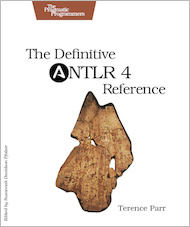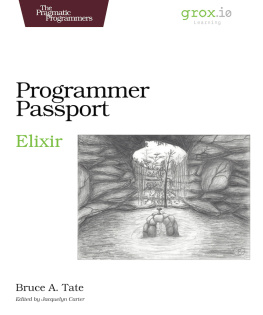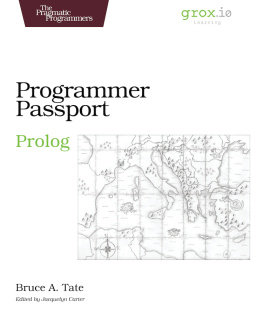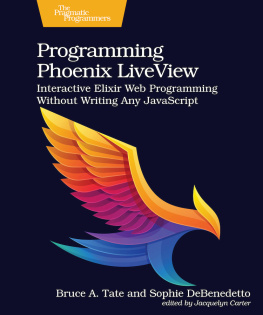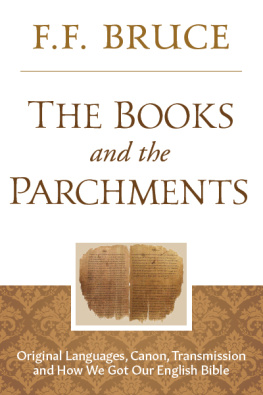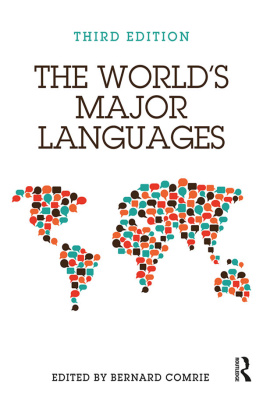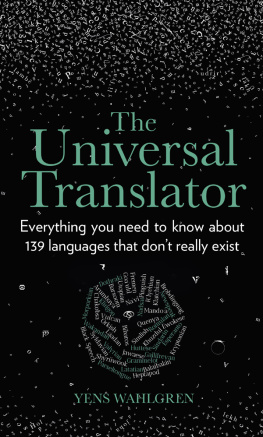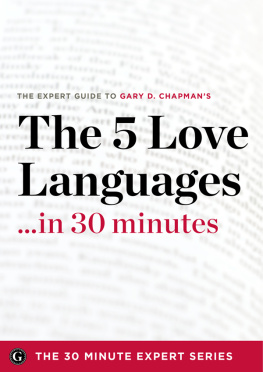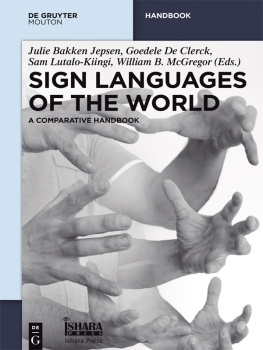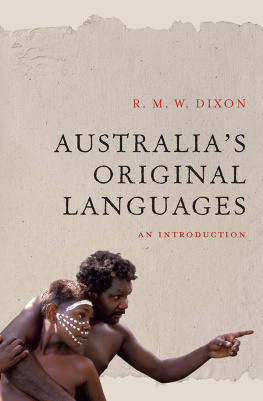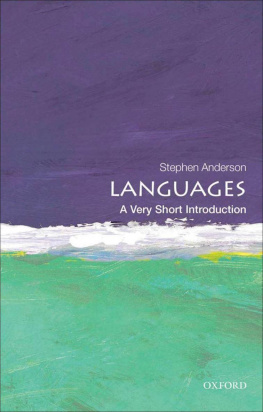Bruce Tate - Seven more languages in seven weeks: languages that are shaping the future
Here you can read online Bruce Tate - Seven more languages in seven weeks: languages that are shaping the future full text of the book (entire story) in english for free. Download pdf and epub, get meaning, cover and reviews about this ebook. publisher: OReilly Media, genre: Home and family. Description of the work, (preface) as well as reviews are available. Best literature library LitArk.com created for fans of good reading and offers a wide selection of genres:
Romance novel
Science fiction
Adventure
Detective
Science
History
Home and family
Prose
Art
Politics
Computer
Non-fiction
Religion
Business
Children
Humor
Choose a favorite category and find really read worthwhile books. Enjoy immersion in the world of imagination, feel the emotions of the characters or learn something new for yourself, make an fascinating discovery.
- Book:Seven more languages in seven weeks: languages that are shaping the future
- Author:
- Publisher:OReilly Media
- Genre:
- Rating:3 / 5
- Favourites:Add to favourites
- Your mark:
- 60
- 1
- 2
- 3
- 4
- 5
Seven more languages in seven weeks: languages that are shaping the future: summary, description and annotation
We offer to read an annotation, description, summary or preface (depends on what the author of the book "Seven more languages in seven weeks: languages that are shaping the future" wrote himself). If you haven't found the necessary information about the book — write in the comments, we will try to find it.
Bruce Tate: author's other books
Who wrote Seven more languages in seven weeks: languages that are shaping the future? Find out the surname, the name of the author of the book and a list of all author's works by series.
Seven more languages in seven weeks: languages that are shaping the future — read online for free the complete book (whole text) full work
Below is the text of the book, divided by pages. System saving the place of the last page read, allows you to conveniently read the book "Seven more languages in seven weeks: languages that are shaping the future" online for free, without having to search again every time where you left off. Put a bookmark, and you can go to the page where you finished reading at any time.
Font size:
Interval:
Bookmark:

Dave & Andy.
Many of the designations used by manufacturers and sellers to distinguish their products are claimed as trademarks. Where those designations appear in this book, and The Pragmatic Programmers, LLC was aware of a trademark claim, the designations have been printed in initial capital letters or in all capitals. The Pragmatic Starter Kit, The Pragmatic Programmer, Pragmatic Programming, Pragmatic Bookshelf and the linking g device are trademarks of The Pragmatic Programmers, LLC.
Every precaution was taken in the preparation of this book. However, the publisher assumes no responsibility for errors or omissions, or for damages that may result from the use of information (including program listings) contained herein.
Our Pragmatic courses, workshops, and other products can help you and your team create better software and have more fun. For more information, as well as the latest Pragmatic titles, please visit us at http://pragprog.com.
We strongly recommend that you read this book with the publisher defaults setting enabled for your reading device or application. Certain formats and characters may not display correctly without this setting. Please refer to the instructions for your reader on how to enable the publisher defaults setting.
Im tired of learning new programming languages and thought seven additional somewhat esoteric languages wouldnt be very useful. I couldnt have been more wrong. I loved it. The languages were suitably interesting and compellingly presented, and I now want to experiment with them.
| Brian Sletten |
| President, Bosatsu Consulting, Inc. |
Languages are not just new syntax, they are new ways of thinking about problems. What is the best way to think about user interfaces or scientific computing or distributed systems or safety guarantees? As you dive into each of the languages in this book you will get a glimpse of new abstractions and principles that will help you write better programs in any language. Do it!
| Evan Czaplicki |
| Creator of Elm, Prezi |
If you think reading a book about programming languages wont change your thinking about programming, I dare you to read the chapter on Idrisunless the idea of reasoning about your C++ (or C# or Java) code more clearly and reducing hundreds or thousands of lines of code down to two is not appealing to you, of course.
| Ted Neward |
| Author, speaker, mentor, Neward and Associates, LLC |
Just as an artists choice of oil, acrylic, or watercolor paint constrains the range of effects they can achieve, the languages we choose constrain the programs we can write. Learning a new language enables you to both conceive new solutions and express them in new ways. Read this book to add seven particularly interesting languages to your repertoire.
| Paul Butcher |
| Author of Seven Concurrency Models in Seven Weeks |
Seven More Languages in Seven Weeks is a well-paced introduction to a set of fascinating languages that will be new to many. This one goes at just the right tempo and provides enough detail to be usefulbut not so much as to douse natural curiosity. Definitely a book I would recommend to others wanting to expand their programming horizons.
| Matthew Wild |
| Author, Prosody IM XMPP server |
Seven More Languages in Seven Weeks not only introduces us to a wide spectrum of languages, but also challenges us on how we think about language use and design. Software development is a demanding career and learning new languages will always be essential. That is why the Seven in Seven series is one of the most invaluable reads for any serious programmer.
| Daniel Hinojosa |
| Developer, speaker, instructor, author of Testing in Scala |
Foreword
Back in 2010, I was deeply troubled. The growing list of difficulties in writing concurrent software was nagging at me. The tools I had at hand were clunky, and none of them provided a mental model that helped me reason about the problems I was facing.
I decided it was time for a change.
However, out of the hundreds of programming languages out there, how could I possibly find one that fit my criteria? How could I even filter this huge set into a smaller one that I could explore in more detail? Then I found that someone had decided to tell the exact story I wanted to hear: Bruce Tate had just written Seven Languages in Seven Weeks , which explored Ruby, Io, Prolog, Erlang, Scala, Clojure, and Haskell.
I was familiar with many of the languages in Seven Languages in Seven Weeks but the book did more than just introduce programming language constructs. It introduced their philosophy, community, and thinking models. To me, the book was telling a story about concurrency, and as I read the book, a very clear picture about immutability, threads, futures, actors, software transactional memory, and more was being painted.
Once I finished the book, I knew exactly which languages and paradigms I wanted to explore next. I bought a heap of books about Erlang, Clojure, and Haskell and I also started writing code right away.
Months later, though, I still hadnt found one language that fit all my criteria. I wanted the robustness and distribution of the Erlang VM, but I also wanted the metaprogramming and polymorphism from Clojure alongside a syntax I was comfortable with. Thats when I decided to create the Elixir programming language that runs on the Erlang virtual machine.
Now, four years later, Elixir is one of the languages covered in Seven More Languages in Seven Weeks .
The interesting thing is that the first book was not a story about concurrency but thats how I read it. Seven Languages in Seven Weeks , as any other excellent book, gives space for the reader to include her own experiences as part of the story, allowing each reader to learn different lessons and, in this particular case, choose other languages to explore next.
This is what makes Seven More Languages in Seven Weeks even more ambitious. Many of the languages in the book are relatively new and in active development, which brings a whole new range of ideas and lessons to be learned. It also opens up the possibility for readers to pick their next languages and not only master them but become part of the language development itself.
Font size:
Interval:
Bookmark:
Similar books «Seven more languages in seven weeks: languages that are shaping the future»
Look at similar books to Seven more languages in seven weeks: languages that are shaping the future. We have selected literature similar in name and meaning in the hope of providing readers with more options to find new, interesting, not yet read works.
Discussion, reviews of the book Seven more languages in seven weeks: languages that are shaping the future and just readers' own opinions. Leave your comments, write what you think about the work, its meaning or the main characters. Specify what exactly you liked and what you didn't like, and why you think so.

